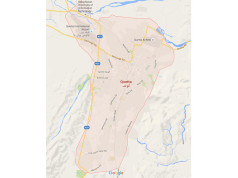Anita Wilson
A PILDAT Working Paper (2012) highlighted that Balochistan’s literacy rate stands at 51.5% and requires serious attention. A thin rate of urbanization and a high unemployment index of 20% have also caused a low annual growth rate. Data suggests that Balochistan has had a flimsy growth performance over the past decade and its GDP per capita is also the lowest when compared to other provinces. Today the geography of Balochistan is again under the threats due to change in political scenario.
Gwadar Port is located near the Strait of Hormuz which is the only maritime route for the oil supply of Gulf States. World’s 40% oil is supplied from the Strait of Hormuz. Baloch Sea is suitable for shipping in entire year due to warm climate of Balochistan. While the seas of those countries which are in cold regions become unsuitable for shipping in whole year due to ice burgs in sea. This makes Baloch Sea important for these countries in order to do their trade activities constantly in entire year. Different civilizations could be seen staying on the coastal areas because maritime routes had been used for the trade activities, and the modern trade increased the need of trade through maritime routes. For this purpose, the importance of Balochistan is like a gateway or an important commercial door. Balochistan has borders with Afghanistan and Iran, and it had always played an important and central role in the regional politics of both neighboring countries.
Gwadar Port, an active and developing port in terms of an economic center, compelled the regional and global powers to prepare their infrastructure in order to get access to the energy resources of Central Asian states. The interests of Iran and Dubai (United Arab Emirates) Ports are to put the Gwadar Port out of the competition, because the surrounding countries of the Strait of Hormuz work as a gateway. Balochistan holds most important status in this region in terms of geostrategic position in the region due to Gwadar Port. Not only Pakistan, but other countries of this region want to be a beneficiary of this port, among which China is on the top.
Gwadar Port has great importance for the Chinese interests in terms of its defense, trade and regional development. China established the Coastal Highway by the investment of $198 million which connects Gwadar Port to Karachi. China considers Gwadar Port very important because Kashgar to Gwadar corridor will be available on very small cost for exports and imports from Central Asia, Europe and Africa as compared to South China Shanghai Port. Gwadar Port has one another quality; if U.S would close the Strait of Malacca, then maritime route of Arab sea will always be opened for both Pakistan and China for commercial activities due to Gwadar Port. Pakistan can monitor the transportation all oil supplying ships in Persian Gulf through Gwadar Port.
The progress on Gwadar Port has been the most significant development task in recent years. Once developed, the port would be a game changer for the province, the China-Pakistan Economic Corridor will open up new avenues of opportunities for the people of Balochistan. It is envisioned that Gwadar would be transformed into an economic hub and will subsequently contribute towards the development of the whole province, resulting in addressing the various economic and social problems of Balochistan. Another potential sector, that can change the fate of the province, is mining. The province is rich in mineral resources and the mining sector would flourish, as the CPEC would become operational. It would contribute towards reducing unemployment in local areas. It would also enable the local government to develop and enhance its human resource. Strengthening micro and medium small sized industries in Balochistan would also contribute towards achieving greater benefits for the local population. There is a need to develop a positive image through media of the China Pakistan Economic Corridor to remove misconceptions that the locals may have.
The recent uproar relating to changing the route of the corridor has raised doubts for the locals. The inhabitants of province are of the view the development that takes place should be spread evenly throughout the province and more specifically the benefits should be translated to alleviate the poor situation of the Baloch, that is, the development should not be Gwadar-centric only. Therefore, this highlights that the locals must be aware of advantages, the development of the CPEC would bring and the potential that it holds for the locals. The mining sector would bring prosperity; however, it is necessary to consider environmental hazards and to incorporate all aspects of environmental security into the existing policy. New developments bring new challenges along with them and both, the provincial and federal governments, should be prepared to deal with them.
The government of Balochistan will need to develop policies and provide a clear direction on how resources are to be leveraged towards economic growth, poverty reduction and the creation of new jobs and opportunities for the local population. This should include a plan that outlines a process of inclusive growth and aligns it with the public and private sector actions.
Writer is a Research Scholar in Department of Political Science, University of Karachi. She can be reached at [email protected].
Disclaimer: Views expressed in this article are those of the author and Balochistan Voices not necessarily agrees with them.
Share your comments!








